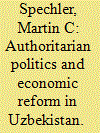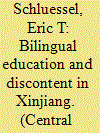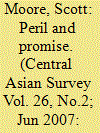|
|
|
Sort Order |
|
|
|
Items / Page
|
|
|
|
|
|
|
| Srl | Item |
| 1 |
ID:
080405


|
|
|
|
|
| Publication |
2007.
|
| Summary/Abstract |
All the ex-Soviet Central Asian states have super-presidential, authoritarian regimes with poor human rights records. Using the Universal Declaration of Human Rights, the article shows that Uzbekistan has sometimes improved, when the economy has been good, and has a mixed record on religious, labor, and language rights. All these states are sensitive to outside pressures if applied tactfully but try to maintain their independence from all outside powers
|
|
|
|
|
|
|
|
|
|
|
|
|
|
|
|
| 2 |
ID:
080409


|
|
|
|
|
| Publication |
2007.
|
| Summary/Abstract |
Efforts to promote and impose Mandarin Chinese as the language of instruction in ethnic minority schools in the Xinjiang Uyghur Autonomous Region, aimed at further integrating the state and raising regional educational and economic quality, have had mixed success. The 2004 plan to consolidate Han Chinese and minority elementary and middle schools and to make Mandarin the universal language of instruction in those schools is fostering an immersive second-language environment without prior preparation for students, bringing native speakers of Mandarin into unfair competition with non-native speakers. The increased focus on Mandarin has already had grave consequences for ethnic relations, especially in urban Uyghur schools, where the project is focused, while the mandate for change in educational curriculum and methodology has also been poorly planned and remains under-resourced, negatively impacting educational quality. The Chinese government has available to it other language policy solutions that are both more workable and friendlier to minority sensibilities.
|
|
|
|
|
|
|
|
|
|
|
|
|
|
|
|
| 3 |
ID:
080404


|
|
|
|
|
| Publication |
2007.
|
| Summary/Abstract |
Afghan tribes and local communities have been exposed to foreign patronage since at least the 19th century, but the scale of patronage relative to Afghanistan's internal economy increased dramatically after the late 1970s. Inevitably, this had a major impact on Afghanistan's own internal dynamics and on the mechanisms of political legitimisation. This article focuses on the province of Kandahar, which occupies a privileged space in Afghan politics and history, having given origin to almost all of the country's ruling elites. It deals with three groups of tribal strongmen, who tried to use tribally based patronage systems to stake a claim to local power.
|
|
|
|
|
|
|
|
|
|
|
|
|
|
|
|
| 4 |
ID:
080407


|
|
|
|
|
| Publication |
2007.
|
| Summary/Abstract |
The position of Kyrgyz adat (traditional customary law) on the practice of non-consensual bride kidnapping in Kyrgyzstan has not been documented nor is there a consensus among the ethnic Kyrgyz on whether or not non-consensual bride kidnapping is a Kyrgyz 'tradition'. This paper provides a review of the historical and ethnographic evidence regarding the frequency and appropriateness (according to Kyrgyz adat) of non-consensual bride kidnapping in traditional Kyrgyz society before the political, economic and social changes of the Soviet period. The evidence presented by this research discredits the widely held belief in Kyrgyzstan, that non-consensual kidnapping is a Kyrgyz adat tradition that was widely practiced with general social approval in ancient times. The information provided in this paper can be used by educators, legislators and the media to demonstrate that non-consensual kidnapping is not legitimated by pre-Soviet Kyrgyz adat tradition.
|
|
|
|
|
|
|
|
|
|
|
|
|
|
|
|
| 5 |
ID:
080408


|
|
|
|
|
| Publication |
2007.
|
| Summary/Abstract |
The article demonstrates how Clarmont P. Skrine, who served in 1922-1924 as British Consul-General in Kashgar (Xinjiang), constructed the descriptive narrative in his well-known 1926 book, Chinese Central Asia. The extensive archive of Skrine's letters and other writings makes it possible to compare the book with its sources and learn about authorial intent, self-censorship, and literary devices. It may be possible to apply the methodology of this example to other Western accounts about Central Asia in order better to establish their strengths and weaknesses as historical sources
|
|
|
|
|
|
|
|
|
|
|
|
|
|
|
|
| 6 |
ID:
080410


|
|
|
|
|
| Publication |
2007.
|
| Summary/Abstract |
This article outlines the growing importance of India's relations with the Central Asian region. In particular, it explores security, economic, and cultural dimensions of the relationship. Important considerations for India in dealing with Central Asia include terrorism, Islamic fundamentalism, energy security, and new export markets. Of equal gravity, however, is the nature of great power competition in the heart of Asia. The argument presented here is that India's relations with Central Asia are calculated to gain strategic depth in the region. However, relationships with Pakistan, the United States, and the Asian great powers tend to constrain these ambitions. The future direction of India's strategic relationships with Central Asia remains fluid
|
|
|
|
|
|
|
|
|
|
|
|
|
|
|
|
| 7 |
ID:
080406


|
|
|
|
|
| Publication |
2007.
|
| Summary/Abstract |
This article aims to analyse the birth of a new ideological movement called 'Tengrism'. According to its theoreticians, Tengrism represents a key element in the identity renewal of Turkic-Mongol peoples and should be adopted as the official religion by the new states of the region. This paper enquires into the ways in which Tengrism is being politically deployed in the service of post-Soviet nationalisms in Kyrgyzstan and Tatarstan and to a lesser extent, in Kazakhstan, Bashkortostan and Buryatia. Although the ideologues of Tengrism may be marginal to the political mainstream, it is nonetheless important to analyse the role of 'ethnicized' forms of religious expression and their relationship with the search for post-Soviet national identities
|
|
|
|
|
|
|
|
|
|
|
|
|
|
|
|
|
|
|
|
|